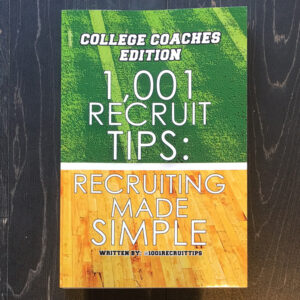Before you even make your first call, always keep in mind that Mom and Dad often hold the veto card. As this is the first major decision most players are making– no matter how independent or tough they seem — recruits often go to their parents for approval and advice before making their final decision.
Too many times, I’ve seen a “best on paper” opportunity for the prospect, and their interest and desire in a program ultimately be vetoed by Mom or Dad. The school is too far away, there’s not enough early playing time, it’s in too big of a city, it’s not an academically prestigious university… for whatever the reason (true or not), Mom and Dad often have the veto power to eliminate schools.
UNDERSTAND THAT PARENTS, MORE OFTEN, HAVE THE POWER TO SAY NO AND ELIMINATE A SCHOOL THAN TO SAY YES AND MAKE THE DECISION.
While winning over the parents can definitely help your cause, it’s important to also evaluate if you think the parents will sabotage the decision in the end. Many prospects will drop a school if Mom or Dad doesn’t approve, and sometimes they wait until the end of the process to do so when their parents finally put their foot down. If a parent is dead set against them signing with you from the start (usually too far from home or not academically prestigious enough), you need to decide how much time you want to invest in their recruitment. It’s over before it even gets started in some cases.
While you will need to win both parents over, you especially need to make a friend in Mom. Mom will be asking questions, doing her homework and putting you through the ringer before handing over her baby! No matter how old the prospect is, to Mom– she’s undoubtedly going to do her homework on you and your university. You need to be informative and personable with Mom, have the answers to her questions before she even asks and build her trust! She’s sizing you up as a parent away from home, not necessarily just an X’s and O’s coach. She’s not evaluating only what you can do for her child during games, she’s looking all phases of her child’s life on your campus.
SURE… WINS, GEAR, DRAFT SUCCESS, TV GAMES AND EARLY PLAYING TIME ARE FUN AND EXCITING BUT A MAJORITY OF PARENTS ONLY REALLY CARE ABOUT “LIFE AFTER SPORTS,” THEIR EDUCATION AND THEIR LIFE EXPERIENCE OPPORTUNITIES ON CAMPUS. THIS IS WHERE YOU CAN SEPARATE YOURSELF AS A RECRUITER!
You need to envision the “family away from home” situation that you will be providing when coming up with your recruitment plan for parents. Put yourself in their shoes, they’re putting their greatest possession in life in your hands. You will be the mentors that will help their child transition into adulthood. Tailor your recruiting pitch to parents differently than how you sell the program to recruits– and each family will be different. What values are important to you and upheld within your program?
When selling the program to most parents, lead with academics! At the end of the day, most parents focus a lot of attention on academics– always have an academic mention in your talks and notes. If the player isn’t a great student, promote ability to help the player with tutors, technology, internships and track records with former player academic improvements. (See page xxx for more advice on recruiting parents.)
ACADEMIC CONVERSATION TOPICS FOR PARENTS:
• Academic Advising
• Job Fairs
• Academic Progress Rates
• Graduation Success Rates
• Internship Opportunities
• Majors
• Career Development
• Job Placement
• Cost of Degree
• Graduation Pictures
• Companies That Hire Recent Graduates
• Small Class Size
• University Academic Program Rankings
• Online Campus Tours
• Campus Pictures
• Campus Leadership
• Team GPA
• Quotes from Former Players about Their Academic Experience
• Campus Speakers
• Student-Athletes in Leadership Roles on Campus
• Student-to-Faculty Ratios
• University Admission Rates (if selective)
MORE: 180 Ways to Market Your Program
A key complaint that I’ve heard over the years is that parents aren’t always informed by their children, so you need to share key information with them directly as well, because it won’t always trickle down to them. Important conversations also need to be brought up with parents, get to know their likes and dislikes. Ask them if they have questions about what to expect, and if they want some advice on what to expect. Help them eliminate stress and anxiety about the process with a general conversation about the process. Share updates about your program with them, dates of upcoming events so that they can plan, and congratulations on their children’s accomplishments! You need to build a direct relationship with parents as well.
What matters most to the parents of your top prospects needs to matter to you, they want to be heard and understood (as long as it’s within the rules and your program’s philosophy). What values or decision factors are important to each prospect’s family?
AFTER GREAT CONVERSATIONS OR VISITS, DROP A HANDWRITTEN NOTE OR LETTER IN THE MAIL TO PARENTS THANKING THEM FOR THEIR TIME, COMPLIMENTING THEIR CHILD’S SKILLS OR INTANGIBLE STRENGTHS, THEIR ROLE AS A PARENT. BE GENUINE AND THANKFUL, YOU DON’T HAVE TO ALWAYS BE “SELLING.”
When dealing with parents, always remember that you are building a career and that parents all talk to each other. Never promise something that you can’t deliver, or have no intention of ever delivering. You will run into uncomfortable situations, there will be times when you have to give bad news to parents. In all situations with prospects and their families, it’s best to be honest and direct with them. Don’t lead prospects and their families on a wild goose hunt. Don’t continuously dodge their calls or just fall out of communication with them. Parents and prep coaches talk and share information on character and integrity, respect carries on for decades.
MORE PARENT TIPS:
• Always consider this: you will be linked to the parents and families of your signees for the next few years. Their attitudes will be magnified once their child is enrolled. Supportive parents become great assets, and difficult parents become even more of a disability and nuisance. Keep this in mind as you move forward– parents will always be in their child’s ear. They will either be promoting a good attitude and work ethic through tough times (which all players go through), or they’ll be a negative force, stirring the pot and creating extra drama when you need it least. Again, parents can help you or hurt you so proceed with caution and consider this during recruiting!
COACHES: Read more from ‘Recruiting Made Simple’
• On the topic of playing time with parents: never let parents dictate how you do your job. Of the most successful coaches that I’ve worked with, parents calling about playing time has resulted in the player remaining on the bench. Parents who badger you about playing time during the recruiting process will only scream louder once their child is enrolled and plant negative seeds in the player’s mind. During the recruiting process, offer players an opportunity to “compete”– not necessarily a guaranteed starting job.
• An unwritten rule in recruiting: head coaches are looking to hire married coaches. A married assistant coach is perceived much more trustworthy and reliable while a single coach is perceived as a bachelor or bachelorette. True or not, many head coaches prefer to fill their staff with a majority of married assistant coaches.
• If you are married, invite your spouse to be able to be a part of important visits, especially events that parents attend. When creating a “family” atmosphere, get as many family members that you think would be good ambassadors to recruiting events. Great recruiters often have spouses who are also great recruiters– friendly, knowledgeable, supportive and great closers. Talk to your head coach about possibly including spouses during select recruiting events, Official Visits or Unofficial Visits. Check with the Business Office and Compliance Office about restrictions.
FIND MORE: Get more Coach Tip articles here





